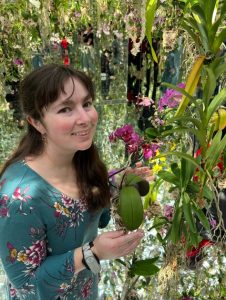
On the walk to my grandmother’s grave,
my mother says she’d like to be buried in a cemetery
by a lake where the family could go to have picnics.
I nod, like I understand cemeteries. Like I understand
my mother’s need to visit and be visited, as if this is the only way
we can still talk to the dead (as if there are no poems).
Like I can imagine burying my mother, my husband,
myself. Like I can imagine my grave as anything
but grown over and haloed by vultures.
I’ve been told there’s a place prepared for me
with many rooms. No one in Heaven is going to look
for these bodies, forgotten like faded nightgowns.
A grave says nothing, remembers nothing.
There are so many stones grown over,
engraved names that fill with dirt and time.
A woman on the radio cried when she read a letter
found in an abandoned home from a dying woman
giving birth to a son no one knew about.
I worry about her, the radio woman said.
Abandonment is worse than death—it means
no one cares. I’m afraid of the clean slabs
ripped-down homes make, afraid of becoming one:
paved over, no one would know I was ever here
(isn’t that why there are poems?).
I pull back the grass. In my notebook,
I write down names
I’ve never heard before. Carry them
in my mouth as we drive home
like hard candies and whisper them
sweet under my breath.
Meg Eden Kuyatt teaches creative writing at colleges and writing centers. She is the author of the 2021 Towson Prize for Literature winning poetry collection “Drowning in the Floating World” and the forthcoming “obsolete hill” (Fernwood Press, 2026) and children’s novels including the Schneider Family Book Award Honor-winning “Good Different,” and “The Girl in the Walls” (Scholastic, 2025). Find her online at megedenbooks.com.